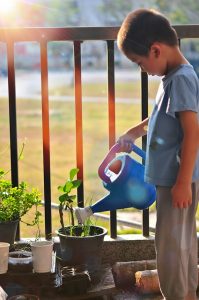P.M. Bottom line: investing time now in raising independent kids yields numerous benefits in both the short and long-term. In fact, the benefits might be seen a lot sooner than you think. And one of the main ones is that you get to be a more productive mama when your kids are independently productive! This is a very long post, as it is a compilation of a series. Consider downloading the PDF for reading later, at your leisure. Whatever that is!
I dubbed May Messy Moms Month and now I’m calling July Independence Month. Throughout the course of the month I will be adding to this post, as well as sending out more detailed installments to my subscribers, focusing on ways to cultivate appropriate independence in kids at all ages and stages.
Caveat: I have no degree in child development. I am not a certified teacher. I have limited experience with special needs kids. Everything I say is my opinion and is geared toward those with typically developing children. I’m a mom (of three pretty independent kiddos) just sharing my thoughts and experiences, offering unsolicited advice. Take this for what you will. Use what works and leave the rest!
Caveat 2: Some might say I’m chore-centric. Yes, I focus on chores here. Why? Because chores are not punishment for being born into my family, despite what my kids might say. Chores are real jobs that benefit the family and build real life skills your child will need in his or her future home and life. Skills needed for independence. So yes, much of what I say will be about chores.
This post may contains affiliate links, which means that if you click on one of the product links, I might benefit in some way. Please feel free to check out the full affiliate statement and disclosure here.
Part I
BENEFITS of INDEPENDENT KIDS
I know most of these probably go without saying. But I’m still going to say ’em!
- more time for mom – HUGE for me
- more energy for mom
- confident kids – they know they can handle themselves in various situations and know you trust them with real, important jobs
- healthier kids who can cook real food as adults – fewer health issues for them and your grandkids (yes, I’m thinking ahead)
- financially stable kids – they don’t have to pay others to cook for them, fix things, etc.
- kids who know how to learn – struggling to solve a problem increases their critical thinking skills
- kids who can creatively entertain themselves – they won’t rely on others for this
- kids who know when and how to ask for help – how many of us still need practice in this area?
CHALLENGES OF INDEPENDENT KIDS
- more messes – face it: there gonna MESS UP and BE MESSY
- tasks take longer as they learn them – anything new takes time to learn
- more work for you to teach them – YOU are going to invest that time in gifting these skills to your children
- imperfectly done tasks – they will NEVER do it like you do it.
- discomfort in seeing your kids try something and fail – it’s not really a fail if they learn from it!
- dealing with their stubbornness, defiance or insistence that they know what they’re doing – you’ll get that anyway, so might as well make it a productive endeavor! Choose your battles when they insist on doing something their way.
 One of the challenges of Parenthood is adjusting to whom our kids become. When I watch our home movies, I see that in many ways my kids are exactly who they were when they were tiny. But they do change so very much in the course of growing up. When we are first introduced to them, they are helpless. We do everything for them. Some of us relish our role as loving parent and caretaker. For some of us, that is a role we do not want to give up.
One of the challenges of Parenthood is adjusting to whom our kids become. When I watch our home movies, I see that in many ways my kids are exactly who they were when they were tiny. But they do change so very much in the course of growing up. When we are first introduced to them, they are helpless. We do everything for them. Some of us relish our role as loving parent and caretaker. For some of us, that is a role we do not want to give up.
And we never fully do. But we have to adjust how we offer that love and care. I believe it’s the Love and Logic authors who advised us to never do for our children what they can do for themselves. of course we will sometimes help them out if they are ill, having a bad day or extra busy. But I like this advice as a general rule of thumb. This advice can be a first step in encouraging Independence in our youngest family members. Plus, young kids really enjoy trying out their new skills and proving how big they are. “All by myself!” is a joyful victory cry with which many of us are familiar. But even when these cries become more sparse, continue to encourage the independent successes and the motivation behind them.
Do you do these things that your kids could do?
-
- Fill out school or activity paperwork?
- Fill out medical paperwork? – Starting at about 10 (depending on the kid), hand that paperwork over to them! They can’t fill out all of it, but they know their names, addresses, birthdays, phone numbers, allergies, etc. And if you have multiple kids, this saves so much time!
- Write out checks? Kids often think things are magically paid for! Having my kid write out the check for kungfu/soccer/cheer/piano gives them an idea of how money works, lets them practice a life skill, shows your investment in them and more! Plus, I’m driving and they’re sitting there anyway.
- Laundry? This isn’t for every family, but it would benefit many families and does ours. First, there’s a very natural consequence to NOT doing laundry if you have a kid that cares about outfits (not all do, I know): no outfit. Second, If I had to do all the laundry in my house, I would cry every day. Third, you don’t have to start your five year old out by doing the entire job. Start by having her fold her own laundry and/or household items. Then gradually add more as they mature.
- Keep track of library books?
- Clear their dishes and load their dishes in the dishwasher? This small step makes a big impact on the job of washingdishes! And very young kids can do this.
- Picking up toys? Tiny kids can do this, but the smaller they are, the simpler putting them away must be.
- Flush the toilet? Call them back over to do this, please!
- Bring their homework or other forgotten items to school? Consider this one carefully. It’s best to figure this out before high school. If it’s a one off incident, OK. But if this is chronic, consider letting life be the teacher here.
- Register for a desired class or program? When my kid wants something, I have them do the preliminary research. They are interested and I am busy. They bring or send me the information so I can help with the final steps. The research also exposes them to the cost, the expectations, the schedule and time commitment.
- Pack for soccer/kungfu/cheer?
- Go to the bank? Have them set up and be involved in their own account activity.
- Apologise? If your child messes up and hurts someone or damages something, your child needs to speak the words directly to the hurt party. OR if my kids want to skip out on a commitment, they have to use their own voices to relay that message and reason to the other party or parties involved. The idea of that is usually enough for them to seriously consider the commitment.
- Homework? I’m not saying never help your kid with homework, but do have an awareness of how much you ARE doing and why you are doing it. Make sure you’re not doing what your kid COULD be doing. And if your kid can’t do it, there are other question to be asking.
- Making store purchases? Small purchases are a great way to practice life skills and independence.
- Cooking meals or doing the prep work?
- Basic pet care?
- Replacing toilet paper?
- watering plants? Even toddlers can help water outside plants. Even better if those plants produce food for the family.
- I almost forgot cleaning their rooms (thanks, Kim)! This is a process, so look for tips on it as you read on.
Part II
CONSIDERATIONS in RAISING INDEPENDENT (and HELPFUL) KIDS
Think back to potty training. For me, that’s our first real exercise in supporting kids to a stage of independence. Not every kid is ready at the same time. It’s often done in stages: First my kid notices she’s already wet her diaper. Soon she’s bringing me a diaper. Then she’s telling me AS she pees. Later, she’s having accidents right next to the potty. Eventually she’s making it there in time. Next, she’s taking over wiping and hand washing. Over time, she’s taking on more and more until she reaches complete potty independence!
It’s often NOT done in stages. Sometimes a kid seems oblivious and then is suddenly ready to take a huge leap.
Sometimes there are still mistakes and accidents. Then we stop, assess, support and continue on.
Is my kid shy? A shy kid can be independent. Don’t push your child to go against his or her nature. Just be sure he or she is doing what is they can within that nature. A shy kid may have trouble asking for directions in a crowded room. So perhaps encourage more pre-planning and information gathering before leaving for the appointment or event.
Do your kids do a poor job or not bother remembering information because you are always right there, acting as family “fixer?” Stop! Coming in after them and re-doing the job sends the message that you don’t trust them to do it right. Or you don’t trust that they will remember themselves. Let them forget. Have them hunt down the information themselves. Have another relative or friend stumble upon the poorly done job and ask about it. Or have them deal with whatever the real consequences of that poorly done job are.
I know sometimes there aren’t any clear ones.
 Do your kids have free time to practice independence? Here is a recent article that goes into more depth about overscheduled kids not developing the high creativity levels of past generations. I would argue that creativity leads to creative problem solving, which leads to the confidence to independently figure out life skills and LIFE in general.
Do your kids have free time to practice independence? Here is a recent article that goes into more depth about overscheduled kids not developing the high creativity levels of past generations. I would argue that creativity leads to creative problem solving, which leads to the confidence to independently figure out life skills and LIFE in general.
https://raisedgood.com/childrens-busyness-not-badge-honour-need-change/
Notes from this article that I think pertain:
–“the days of kids being kids and playing all day long has been erased from our society’s collective memory. We’ve devalued what children need most and replaced it with excessive adult control.”
–“an alarming move away from an internal towards an external locus of control in children of all ages with the trend being even more pronounced in younger children.”
–“Why is this a concern? Because children with a bias towards externality are more likely to focus on goals such as materialism and status, rather than pursuing intrinsic aims which bring true and lasting happiness. They experience a sense of helplessness, decreased self-control, and a predisposition to narcissism, anxiety and depression.”
-“the decline of free play is largely responsible; after all, play is the only part of a child’s world in which they’re freely able to express their control.” [or their INDEPENDENCE!]
GO READ IT. It’s not very long. And the points apply to kids of all ages. Your youngest kids need that free play, as WELL as your older kids!
BONUS: free play means YOU get free time. Of course, make sure everyone is safe, but leave them alone as much as safely possible and take care of your own business!
Always ask yourself, “Did I really teach my kid how to do this?” Especially if you have a few kids! Sometimes we don’t realize we never actually took the time to TEACH a skill. And remember older kids can teach youngers, too.
Let them be in charge of something, anything, from a very young age. Washcloth folding, water bottle collecting, light patrol (making sure lights are off), water pitcher filling, whatever!
 Do you have pets? Especially if you got the pet at your child’s request, have your child/ren do as much pet care as possible. There are natural consequences to not keeping up on pet care for your child to learn from. Pet care tasks can be simple as you work your way up:
Do you have pets? Especially if you got the pet at your child’s request, have your child/ren do as much pet care as possible. There are natural consequences to not keeping up on pet care for your child to learn from. Pet care tasks can be simple as you work your way up:
wiping up the pet feeding area
cleaning the pet dishes
feeding the pets
making sure water is fresh and full
picking up pet messes
scooping litter
pet hair removal from furniture
walking dogs
cleaning cages/tanks (even the outside for younger ones)
Can your child/ren walk anywhere independently? This shows your confidence in them and allows for safety conversations with them. They will become more aware of what’s around them as you discuss their route. I don’t mean take a two mile walk, but start with round the block.
- would having the dog with them help?
- I gave my kids walkie talkies and asked that they check in at certain points
- let sibling sets go together
Break down jobs into steps. Young kids can’t keep track of the ENTIRE job. Using our laundry example, your kid could just do ONE of the many steps, such as:
bring laundry to laundry area/empty hampers
Put hampers back
put away only towels (or napkins or whatever is easiest)
fold only napkins (or towels or underwear or whatever is easiest)
sort items by color or person
Making a bed and cleaning a room are also multi step jobs that can confuse young kids. They SHOULD have some responsibility for their own space in some way, though. Break the steps down for them, help them with what they can’t yet do and work toward having them eventually do more and more of the steps. Or if your kid is old enough by has trouble remembering the steps, I LOVED this resource because it broke it down in an easy to track way: https://timestales.com/products/zone-laundry-mini-bedroom-clean-n-flip-bundle-kit
Are items at kid level? If you think your child is ready to help set the table or you’d like your kid to take care of snacks, make sure the needed items are not on high shelves. Napkins and placemats aren’t breakable and you can put sturdier bowls and plates on a lower shelf or cabinet. If you do this, you’ve automatically made unloading the dishwasher and putting things AWAY well within their capability! Put preapproved snacks where they can be reached. Perhaps reassign the produce drawer as the snack drawer. And keep a fruit basket within reach. Other items to make accessible: water bottles they can fill themselves, sunscreen they can apply, sun hats, silverware, food storage containers to put away
Occasionally switch up jobs so kids practice different ones. This also gives kids an appreciation for what’s involved when it’s NOT their turn.
Let older kids teach younger. When you invest the time in those older kids, it trickles down in numerous ways.
Let your kid mess up. Let her disappoint and be disappointed in herself. The consequences are small when they are. The consequences grow as they do. Better to mess up early and learn early.
Listen to your kids’ input. They might have some good ideas about a task or how to approach a problem. They will have a sense of pride and ownership of a job when you adopt their changes and genuinely appreciate their ideas. And if you don’t love their idea, try it anyway.
Might a job (paid or volunteer) benefit them? Most likely yes, IF it doesn’t negatively impact your family life or school. Being accountable to someone else does wonders for most kids’ sense of independence.
Consider your priorities. If you prefer to do all the laundry, OK. If you would rather be the family dog walker, fine. Just make sure your kids get opportunities to contribute and practice their skills.
Part III
TOOLS to HELP RAISE INDEPENDENT KIDS
Chore charts. There are so many. I loved the chore cards from Managers of Their Chores. It’s super durable, comes with everything you need and includes an incredibly useful and do-able book and system.
https://www.titus2.com/managers-of-their-chores.html
But I’ve seen similar card type systems from others. Here’s a free one.
https://www.naturalbeachliving.com/free-printable-picture-schedule-cards-visual-schedule-printables/
I know that even with just one kid, moms have a lot to keep track of. I always needed a VISUAL reminder of what my kids should be doing each day. Dry erase board lists and the list auto-generated by Homeschool Planet have worked for us at different stages over the years. {Detailed review of Homeschool Planet here.} These also allow you to put the list in your kids’ control when they’re ready.
Visual Calendars (for pre-readers, especially) – some kids really do well knowing what to expect that day. It helps them with transitions and expectations. We had a magnetic one I put at their level on the dishwasher. It had a week view and I placed the magnets in chronological order on each day. Like chore charts, there’s one out there perfect for you.
Kids Cook Real Food – I’ve gone on and on and on about WHY you need to actively teach your kids to cook and WHY KCRF is a great tool for this. Here’s a post summary:
https://productivemama.com/wordpress/future-roommate-training/ – husband or wife training doesn’t sound too PC, but……?
https://productivemama.com/wordpress/bonus-freebie-kids-cook-real-food-ends-june-30/ – old sale, but link to helpful curriculum map
**https://productivemama.com/wordpress/happy-mothers-day-freebie/ – includes two freebies, such as a list of kitchen skills ages and stages and a list of wholesome snacks kids can make with basic kitchen skills. **
https://productivemama.com/wordpress/let-kids-make-snacks-true-gift-mothers-day/ – how teaching kids to cook is a gift for YOU and them
Summer Vacation Survival Kit – this can be used ANY time of year, really. It’s a compilation of activities that don’t require super special ingredients or major artistic skill (whew!). This is great way to encourage independent play or to nudge older kids to lead youngers. Also a great for budding babysitters!
The House Fairy – this tool is a fantastical, fun and effective way to develop independent room cleaning by your younger kids. See my very detailed review here. I strongly encourage you to read the review because there’s actually MORE to the HF than meets the eye. She can help with other independence-enhancing skills, as well.
Part IV
WORDS and THOUGHTS TO SHARE WITH YOUR KIDS
When your children’s effort and results DO improve, tell them WHY you appreciate that or  how THEY benefit. No need to gush over how proud you are or berate them for taking so long to improve. Would a boss do that? Probably not. At least not a good one. Instead try, “Hey good job with the bathroom floor. Now our house guests will be way more comfortable AND safe.” Or “It’s been awesome that you’ve kept track of your rides home this year. It’s really saved us on gas and your sister doesn’t have to wait after school for so long.” “It’s nice to have colorful flowers. Thanks for giving them water.”
how THEY benefit. No need to gush over how proud you are or berate them for taking so long to improve. Would a boss do that? Probably not. At least not a good one. Instead try, “Hey good job with the bathroom floor. Now our house guests will be way more comfortable AND safe.” Or “It’s been awesome that you’ve kept track of your rides home this year. It’s really saved us on gas and your sister doesn’t have to wait after school for so long.” “It’s nice to have colorful flowers. Thanks for giving them water.”
Similarly, tell your kids how their independently finished accomplishments directly impact the family. “When you wash the car, I can make lunch so it’s ready to eat when you are.” Or, “since I’ve turned over making lunch to you, I was able to write three lessons!”
I have told my kids:
“I cannot take care of everyone’s basic needs. You get to be in charge of more of those as you grow up.”
“Do your chores before anything else. Your contribution to the family comes first.”
“Before I give you a solution, tell me three ways you could fix that/figure that out yourself.”
“I had more than one of you so I didn’t have to entertain you.”
“OK, what WOULD happen then?” In response to thinking through issues. I definitely offer plenty of advice as my kids get older, but I like them to think things through themselves first.
Feel free to comment with what you tell YOUR kids as you encourage them in new skills and general family helpfulness.
This post may contains affiliate links, which means that if you click on one of the product links, I might benefit in some way. Please feel free to check out the full affiliate statement and disclosure here.



2 comments